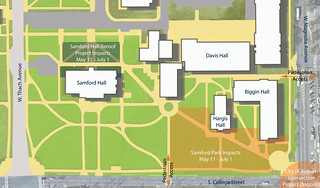Portions of Samford Park at Auburn University to close during summer construction projects
Article body
Portions of Samford Park will close this summer as Auburn University begins Phase II of the Samford Park redevelopment project and replaces the Samford Hall roof. Both projects will begin after spring graduation and are scheduled for completion prior to the first home football game this fall.
"The goal of these two projects is to preserve and beautify this historic campus location that means so much to the Auburn family," said Dan King, Auburn University's associate vice president of Facilities Management. "We chose to undertake these projects during the summer months so that our students and visitors returning this fall will be able to enjoy unobstructed views of Samford Hall, as well as added green space and upgraded walkways throughout the park."
Phase I of the Samford Park redevelopment project was finalized in February with the planting of the two Auburn Oaks at Toomer's Corner. Phase II will begin with the installation of a 14-foot-wide brick arcing walkway reaching from Toomer's Corner to Samford Hall.
"This summer's redevelopment construction will provide the hardscape (walkway) and landscape for Phase II," said Ben Burmester, Auburn University campus planner. "The latter part of Phase II will take place winter 2016 with the planting of live oak trees from the original Auburn Oaks along the new walkway."
From May 11 to approximately July 1, a construction fence will close a section of Samford Park from Toomer's Corner to Langdon Hall. Once the first segment of the walkway is complete, construction fencing will be removed opening the walkway to pedestrians. The remainder of the park will be closed through mid-August as walkway installation stretches from Langdon to Samford Hall.
"We decided to split the walkway installation project into two parts so that we do not have all of Samford Park enclosed in construction fencing during the entire summer," Burmester said. "To minimize the pedestrian impact as much as possible, we have also coordinated with university entities and the City of Auburn to provide pedestrian access from the park to downtown shops during the summer. We ask all of the campus community to exercise caution when traveling through Samford Park to downtown only crossing at designated crosswalks."
Also this summer, sidewalks surrounding Samford Hall will be closed during the Samford Hall roof replacement and minor envelope repair project. This project will involve reroofing the iconic building, as well as recaulking windows, replacing cornices, installing a lightning protection system, and adding new gutters and downspouts.
"Repairs made during this project will protect Samford Hall from weather-related elements for years to come," said Simon Yendle, an Auburn University campus architect. "We are conscious of Samford Hall's historic value and will not change any of the building's current architectural features during the project."
The Samford Hall roof replacement project will take place in two phases. Phase I will begin May 11 with construction fencing and work limited to the west side of the building between Samford Hall and Ross Square. Phase II will begin late June when construction fencing will completely surround the building.
Auburn University Samford Park construction maps are available on the Facilities Management Campus Disruptions webpage at http://www.auburn.edu/administration/facilities/projects/campus-disruption.html.
Access to Samford Park from Toomer's Corner may also be impacted by the City of Auburn's Toomer's Corner redevelopment project. Go to www.auburnalabama.org/cornerconstruction to find important dates and maps related to the city's project.
Related Media
Media interested in this story can contact Communications Director Preston Sparks at (334) 844-9999 or preston.sparks@auburn.edu.
Auburn University is a nationally ranked land grant institution recognized for its commitment to world-class scholarship, interdisciplinary research with an elite, top-tier Carnegie R1 classification, life-changing outreach with Carnegie’s Community Engagement designation and an undergraduate education experience second to none. Auburn is home to more than 30,000 students, and its faculty and research partners collaborate to develop and deliver meaningful scholarship, science and technology-based advancements that meet pressing regional, national and global needs. Auburn’s commitment to active student engagement, professional success and public/private partnership drives a growing reputation for outreach and extension that delivers broad economic, health and societal impact.







